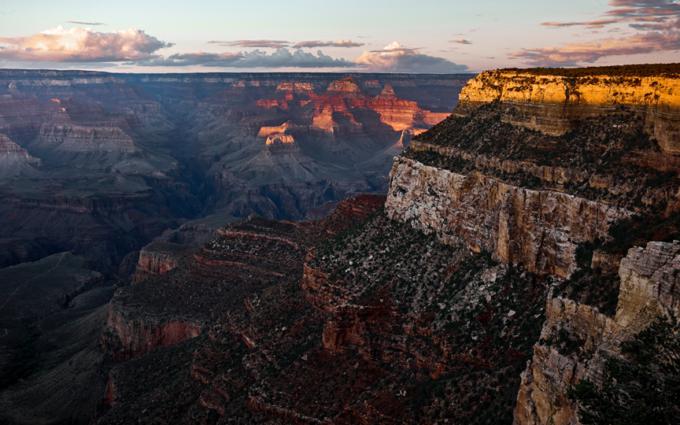
Spirituality
I've noticed that many of the best "old" hymns simply express the natural movement of a good will, as St. Thomas understood it.

Pakaluk
You are waking up in the morning and looking around your dark room, just able to discern the outlines of objects. You see a faint outline of some books on a table. There -- a shirt draped over a chair. You make out a dresser. Then your eyes are drawn to the windows. You realize that sunlight is beginning to appear. It is no longer night. Finally, you reflect on yourself, and notice that you are awake, not sleeping, and seeing, not dreaming.
Change the image. Consider not simply things seen, but beautiful things wondered at. You are sitting under a blanket on a cliff overlooking the Grand Canyon at around 4 a.m. It was pitch black, but soon you begin to see in outline the tips of cliffs across the canyon. You discern their repeating patterns and the repeated layers under them. Gradually, more shapes emerge, and, in the silence, across the disquieting grandeur of the great abyss, you begin to see subtle colors, pastels of light blue, green, and dark orange. From these images, you are drawn to where on the opposite horizon the sun will dawn. Finally, you reflect with wonder and gratitude that you, a mere speck on a cliff, can look out over that vast expanse and, with the gift of sight, share in its beauty.
What I have described are models that St. Thomas Aquinas called the "natural" activity of our intelligence and our will. Intelligence, he said, reaches out to "being" in general, wherever it is found. It is entirely unconstrained: anything that is, we can think about. But next, our intelligence spontaneously looks for a source, as everything it grasps it recognizes as an image, dependent and contingent. In the third place, it turns to itself and recognizes its own existence, as a power of grasping existence.
The will, by nature, takes a similar path. It also reaches out to everything in general, except it regards things under the aspect of "good" rather than as merely existing. In its first natural movement, it affirms as good every created thing that is, without restriction. (Think Genesis: after each step of creation, God "sees that it is good.") Next, our will wants to trace all of this goodness to a source. In last place, it reflects upon its own goodness, and that of the living being whose power it is.
Although I am convinced from observation that St. Thomas is right, because I see children naturally approaching the world in the way he describes, it is also clear that the intelligence and will of most adults, in contrast, have become stunted.
We can see this from the exceptions. Around Christmastime, many of us become children again, and look at the world with the same generous goodwill. The exception proves the rule for the rest of the year. Or consider a couple in love -- I mean, a true and generous love of courtship, not the bondage of mere sex attraction -- they see the whole world with wonder. Any full moon is now more beautiful than anything they've ever seen. It is a gift meant just for them in their love.
I've noticed that many of the best "old" hymns simply express the natural movement of a good will, as St. Thomas understood it. Consider "For the Beauty of the Earth," "Let All Things Now Living," and "America the Beautiful."
Many of the great psalms are like this, also. A footnote in the RSVCE version of Psalm 8 says it is "A magnificent hymn to the glory of God as seen in creation and reflected in man." Indeed, the psalm tracks the natural movements of the will:
O Lord, our Lord,
how majestic is thy name in all the earth!
... When I look at thy heavens, the work of thy fingers,
the moon and the stars which thou hast established;
what is man that thou art mindful of him,
and the son of man that thou dost care for him?
What do we make of all this? I offer the following remarks.
First, although we tend to think of Christian worship as fostering some specifically "Christian" attitude -- an outlook of "faith"-- perhaps to a larger extent than we realize, our faith simply works to set us free, that is, free to see the world as the Creator intended. The hymns I mentioned are profoundly human before they are Christian, even if, in general, only Christians sing them.
Second, I wonder to what extent people externalize issues of freedom that afflict their own persons, and treat them as if they are "political" issues. Rousseau famously said, "Man is born free, but everywhere he is in chains." This rings true for many of us. But perhaps it resonates because our own intelligence and will through our own choices have become stunted.
Third, and obviously, St. Thomas's view is completely at odds with modern views of "instrumental reason" and "rational choice" in the social sciences, which are fundamentally egoistic.
Fourth, a generous movement of the will surely encompasses "goodwill" towards others, which is the starting point for friendship. Maybe the basic reason for the rancor in our society, our lack of friendliness toward one another, is that will for most of us is "incurvatus in se" ("turned in upon itself") in the ominous phrase of St. Augustine.
Psalm 8 and a Christmas carol might be the start of a cure.
- Michael Pakaluk, an Aristotle scholar and Ordinarius of the Pontifical Academy of St. Thomas Aquinas, is a professor in the Busch School of Business at the Catholic University of America. He lives in Hyattsville, MD, with his wife Catherine, also a professor at the Busch School, and their eight children. His latest book is "Mary's Voice in the Gospel of John" available from Amazon.
Recent articles in the Spirituality section
-
No line-drawingMichael Pakaluk
-
Physician-assisted suicide is a slippery slopeCardinal Seán P. O’Malley
-
He saw the cloths and believedBishop Robert Barron
-
God's instrument for viewing the crucifixionMichael Pakaluk
-
QuinquagesimaMichael Pakaluk


















